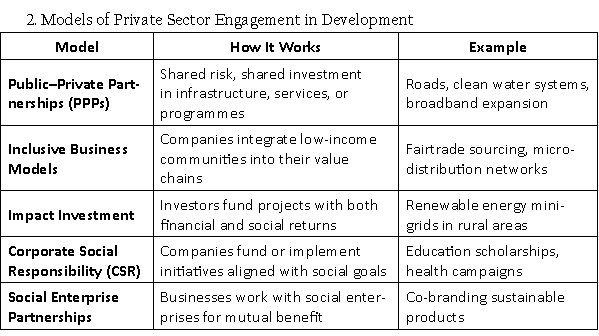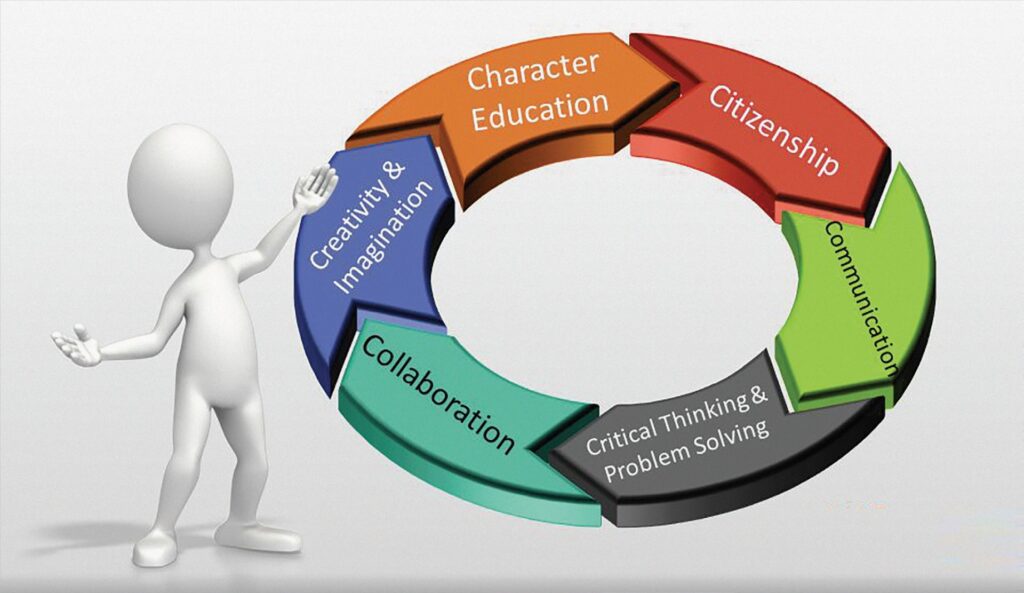

My initial career started with the private sector, first with Anderson Consulting in the USA as change management consultant and later in a premiere financial institution in Nepal. The experiences in these institutions have guided my professional journey and commitment to date. After almost a decade I ventured into the development arena through consulting assignments in Africa, Bangladesh and Nepal. In my more than 25 years of experience in the development sector, I have worked in partnership with a diverse range of private sector actors in various development initiatives in Nepal and other countries with similar development challenges. Although the Social Welfare Council (the monitoring line agency for I/NGOS in Nepal) is averse to bringing in private sector as key partners, the real issue is more about their understanding of the benefits such partnerships can bring to development practices, rather than any policy bottlenecks.
Private sector engagement is the game-changer that turns short-lived development projects into lasting engines of growth. In Nepal, from solar power plants lighting rural homes to agribusinesses linking smallholder farmers with lucrative markets, the private sector brings the capital, innovation, and efficiency that donor aid alone cannot sustain. By aligning business incentives with social impact – through public-private partnerships, inclusive value chains, and investment facilitation – development moves beyond charity to become self-reinforcing, market-driven progress. The result: resilient communities, competitive industries, and benefits that endure long after the initial funding ends.
In my conversations with governments, NGOs, and international organisations, there is an increased realisation that relying solely on public funds or donor aid often results in projects that have limited continuity for desired scale and impact when funding ends. The private sector, however, brings in resources, innovation, efficiency, and long-term commitment that can anchor these initiatives.
In all the above and narratives to follow, capable human resources are the key. As we know technology and approaches can be changed but teams that understand the value of bridging the challenges in developmental initiatives remain key. In an ever-changing environment, adaptive, resilient and sustaining people (team) for any initiative is key – the same is true in this case as we unfold in the ensuing plausible reflections in my article.
1. Why Private Sector Engagement Matters for Sustainability
a) Financial Sustainability: It is important that we, as development practitioners, should always understand that businesses don’t operate on grant cycles; they work on profitability and growth. In any development initiatives, the sustainability angle lies primarily in facilitating financial sustainability – be it humanitarian grants to any short and long-term development activities. For example: Agricultural processors providing seeds and training to farmers because they need a reliable supply chain.
- Diversified funding sources: From the design phase of any development programme, we need to ensure that we are not reliant on a single source of funding. We need to ensure contributions from all stakeholders involved and not just rely on donor mandate funding. This can come from the government, through leveraging private sector funding, and by pitching to other donor agencies. Recently, pooled funding from donor groups with similar development agendas has become an ongoing trend.
Investment, not charity: As we narrate and clarify the role of private sector, when businesses have a stake in outcomes (e.g., market expansion, supply chain development), they are motivated to sustain projects long after initial funding ends. This will ensure that there is a business case (profitability) for them from the beginning.
b. Innovation & Technology: One of the key elements that the private sector can bring to the partnership is their constant focus on innovation and new technology. This is where relevant and resilient systems are built.
- l Private companies often have access to cutting-edge technologies, research, and operational efficiencies that can be adapted to local needs.
l Examples: Renewable energy companies providing solar microgrids, and agritech firms delivering climate-smart solutions. - c. Market-Driven Impact: It is essential that we are market facing and understand the dynamics of needs and changes in the market. Unless we do this with precision, no matter how good the partnership, the initiatives tend to remain project-cycle dependent.
l Development initiatives tied to market demand are more likely to survive.
l Development impact is sustained when communities are economically integrated into markets.
l For instance, farmer training programmes that link directly to buyers create ongoing economic incentives.
d. Skills & Capacity Building: Businesses can provide training, mentoring, and technical know-how, building local human capital that sustains impact beyond project timelines.
3. Conditions for Effective Engagement
1. Mutual Value Creation – There must be a win-win situation and value creation at both ends. Both the development initiative and the private partner must benefit from the partnership – at least in the medium and long run.
2. Clear Governance Structures – In my learning over the years, fostering private partnerships has shown me that transparency is key. There has to be well defined governance structures, and the roles, responsibilities, and accountability mechanisms need to be clearly defined.
3. Local Inclusion – We undermine this to some extent. However, unless we have a local buy-in and involvement of key local level stakeholders, sustainability is a question. We need to make sure that we involve communities in planning to ensure relevance and ownership.
4. Policy Support – One of the value propositions for the government is a scope for policy formulation and advocacy to support development initiatives. Governments should offer incentives (tax breaks, investment protection, regulatory clarity) as their support and buy-in.
5. Impact Measurement – We often times wait till the end of the project to communicate impact and potential scale of the project. We should be conscious and strategically communicate our ongoing impact and planned scale up strategy at regular intervals so that there is clear message on expectations from all stakeholders. The key is to set KPIs for both social and business outcomes.
 4. Risks and Mitigation: It is critical to conduct a thorough analysis of risks and their potential mitigation in discussion with all concerned stakeholders. This will help us understand the environment better and plan our mitigation strategies accordingly. This will ensure continuity in case of occurrence of unforeseen events. Some of the examples of risks and potential mitigation in partnership with private sector are outlined below (these are just references and not the entire foreseen risks – depends primarily in the environment we operate):
4. Risks and Mitigation: It is critical to conduct a thorough analysis of risks and their potential mitigation in discussion with all concerned stakeholders. This will help us understand the environment better and plan our mitigation strategies accordingly. This will ensure continuity in case of occurrence of unforeseen events. Some of the examples of risks and potential mitigation in partnership with private sector are outlined below (these are just references and not the entire foreseen risks – depends primarily in the environment we operate):
- Risk: Private sector prioritises profit over social outcomes.
Mitigation: Binding agreements with measurable social targets. - Risk: Power imbalance in partnerships.
Mitigation: Transparent negotiation and stakeholder oversight. - Risk: Project dependency on a single corporate partner.
Mitigation: Encourage multiple partnerships and open-market approaches.
What we need to be clear is that sustainability isn’t just about lasting longer – it’s about weathering shock. It can be in the forms of:
a) Economic resilience: Market-oriented models adjust pricing or diversify products when markets shift;
b) Social resilience: Local ownership ensures that even if a corporate partner exits, the community retains skills, networks, and income sources; and
c) Environmental resilience: Private partners increasingly integrate green practices to protect resources they depend on.
We at Swisscontact are pioneers in engaging with private sector actors, be it skills development projects, commercial agriculture, enterprise development, tourism, climate action and alternative energy. Below are some examples of come impact stories of ongoing Swisscontact initiatives in Nepal.
1. CASA – Commercial Agriculture for Smallholders and Agribusiness Programme
l Objective: To foster inclusive agricultural systems by integrating smallholder farmer businesses into commercial value chains. It focuses on enhancing food security, gender equity, and climate resilience.
- Key Activities:
- Supports Agri-SMEs in both the dairy and vegetable sectors to access finance, improve business performance, and scale operations.
- Builds smallholder capacity through training in Good Agricultural Practices, Good Manufacturing Practices, post-harvest management, and climate-smart farming techniques (e.g., drip irrigation, organic fertilisers).
- Notable Success Stories:
- Mangalam Dairy and Foods – CASA provided technical and investment-readiness support, helping the private dairy processor secure bank loans to build a modern dairy plant. Once operational, CASA continued helping by strengthening linkages with milk collection centres, improving supply chains, and enhancing product quality.
- Paicho Pasal Pvt. Ltd.: This agribusiness collects and processes vegetables from remote areas and plays a key role in encouraging smallholders to commercialise. CASA supported mapping for collection centres and provided technical assistance, leading farmers like Sher Bahadur Shahi to scale their farming operations confidently.
- l Programme Scale & Impact:
- Engaged over 25 agriculture cooperatives, trained 16,000+ farmers on farming and business practices.
- Provided tailored technical assistance to 19 SMEs (e.g., business planning, marketing strategies).
- Leveraged Rs. 25 crores in investments via bank financing.
- During COVID-19, CASA facilitated revolving funds, grants for cold storage upgrades, and support for dairy cooperatives to sustain operations.
- Enabling Environment: CASA hosted a high-level ‘Nepal Agriculture Investment Meeting’ with over 100 stakeholders – from investors to government officials – to improve the sector’s investment climate.
2. NAMDP – Nepal Agricultural Market Development Programme (Sahaj)
- Vision & Timeline: A 12-year programme (with phased implementation), funded by the Swiss Agency for Development and Cooperation (SDC), led by Swisscontact and Centre for Environmental and Agricultural Policy Research, Extension and Development (CEAPRED). Its goal is to create a thriving, inclusive agricultural sector and increase rural income and employment.
- Key activities/Impact:
- Focused on integrating farmers into commercial markets via Market Systems Development (MSD) approaches.
- Partnered with over 75 private sector and 10 public sector actors across 50 districts.
- This resulted in creation of 1,800 new jobs and increased incomes for 45,800 households.
- Shifts focus toward investment in forward market linkages, commercialisation, processing, and export.
- Supports agri-businesses with financial and technical assistance, particularly in maize, dairy, cardamom, and vegetable value chains.
- Notable Success stories:
- Aadhyanta Accelerator Programme (AAP): In partnership with Aadhyanta Fund Management, AAP provided mentorship, business development support, and investor matchmaking to agribusinesses in Koshi Province.
- Result – Five businesses secured investment commitments exceeding Rs. 200 million, including a Rs. 120 million investment for Birat Feed Mill.
- Market Innovations:
- A Challenge Fund under Sahaj boosted dairy sector innovation – including product diversification (e.g., Gouda and Cheddar cheese) by reducing import dependency and enhancing local livelihoods in Koshi Province.
3. Labour Market Information System (Shramsansar) in Nepal:
One of our recent successes stems from the development of labour market information digital platform. The initiative that started almost three-and-a-half years ago, is now declared as the national labour market information system by the Prime Minister of Nepal. The system now integrated in the Nagarik App was initiated in three municipalities in Koshi Province. Now the system is ready for scale up in all seven provinces of Nepal as highlighted in the plans of the Ministry of Labour Employment and Social Security (MoLESS). Available on both Android and iOS, Shramsansar – now under the government domain (shramsansar.gov.np) – has an easy-to-use interface and access. A key success factor – setting it apart from other similar digital platforms – is its strong buy-in and support from both the public and private sectors. This is evident in the regular posting of vacancies and training information. As of date the platform is accessed by over 22,000 users, 500 plus private sector service providers and is in use in 692 municipalities of Nepal.
Why These Matter
Swisscontact’s agricultural initiatives illustrate a multi-pronged strategy for sustainability:
- Building commercial value chains with private sector integration.
- Enhancing smallholder livelihoods through training, finance access, and supply chain linkages.
- Stimulating local investment and innovation, especially in agribusiness.
- Promoting climate-resilient and market-driven agricultural systems.
- Fostering public-private collaboration to improve services in the employment and entrepreneurship space
In Summation
It is evident from the above analysis that sustainable development depends not only on strong policy and donor investment but on embedding initiatives within viable business models driven by private sector participation. When companies, communities and government institutions collaborate with aligned incentives, development shifts from being time-bound projects to self-reinforcing systems. The result is resilient livelihoods, market competitiveness, and long-term social and environmental benefits – ensuring that progress continues well beyond the lifespan of donor funding.
In Nepal, it is clear from ongoing initiatives that from alternative energy, climate action to agribusinesses linking smallholder farmers with lucrative markets, the private sector brings the capital, innovation, and efficiency that donor aid alone cannot sustain. By aligning business incentives with social impact – through public-private partnerships, inclusive value chains, and investment facilitation – development moves beyond charity to become self-reinforcing, market-driven progress.
Across sectors, for instance in agriculture, partnerships facilitated by initiatives such as Swisscontact’s CASA and NAMDP/Sahaj integrate thousands of smallholders into profitable value chains, enhance climate resilience, and attract millions in private investment. The benefits lie across the value chain from farms to markets. The result is resilient livelihoods, competitive industries, and social and environmental benefits that outlast the initial funding – ensuring progress is not just achieved but sustained for generations.
(The reflections are personal and not of Swisscontact)


